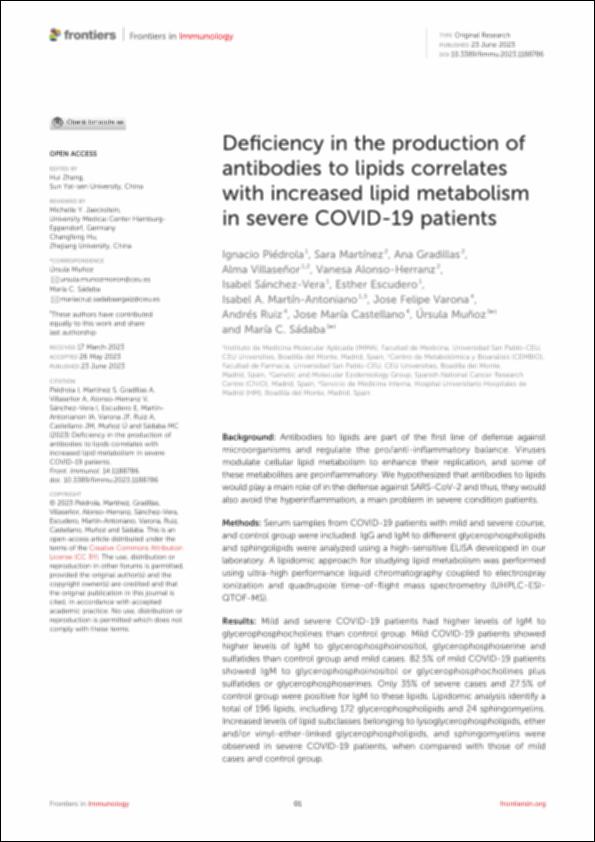Please use this identifier to cite or link to this item:
http://hdl.handle.net/10637/15443Deficiency in the production of antibodies to lipids correlates with increased lipid metabolism in severe COVID-19 patients
| Title: | Deficiency in the production of antibodies to lipids correlates with increased lipid metabolism in severe COVID-19 patients |
| Authors : | Piédrola, Ignacio Martínez-López, Sara Gradillas Nicolás, Ana Villaseñor Solis, Alma Cristina Alonso-Herranz, Vanesa Sánchez Vera, Isabel Escudero Lirola, Esther Martín Antoniano, Isabel Adoración Varona Arche, José Felipe Navarro Ruiz, Andrés Castellano Vázquez, José María Muñoz Morón, Úrsula Sádaba Argaiz, María Cruz |
| Keywords: | Natural antibodies; COVID-19; IgM; Inflammation; Lipidomic; Lysophosphatidylcholine; Lysophosphatidylethanolamine; Phosphatidylinositol |
| Publisher: | Frontiers Media |
| Citation: | Piedrola I, Martinez S, Gradillas A, et al. Deficiency in the production of antibodies to lipids correlates with increased lipid metabolism in severe COVID-19 patients. Front Immunol. 2023;14:1188786. https://doi.org/10.3389/fimmu.2023.1188786 |
| Abstract: | Background: Antibodies to lipids are part of the first line of defense against microorganisms and regulate the pro/anti-inflammatory balance. Viruses modulate cellular lipid metabolism to enhance their replication, and some of these metabolites are proinflammatory. We hypothesized that antibodies to lipids would play a main role of in the defense against SARS-CoV-2 and thus, they would also avoid the hyperinflammation, a main problem in severe condition patients. Methods: Serum samples from COVID-19 patients with mild and severe course, and control group were included. IgG and IgM to different glycerophospholipids and sphingolipids were analyzed using a high-sensitive ELISA developed in our laboratory. A lipidomic approach for studying lipid metabolism was performed using ultra-high performance liquid chromatography coupled to electrospray ionization and quadrupole time-of-flight mass spectrometry (UHPLC-ESI-QTOF-MS). Results: Mild and severe COVID-19 patients had higher levels of IgM to glycerophosphocholines than control group. Mild COVID-19 patients showed higher levels of IgM to glycerophosphoinositol, glycerophosphoserine and sulfatides than control group and mild cases. 82.5% of mild COVID-19 patients showed IgM to glycerophosphoinositol or glycerophosphocholines plus sulfatides or glycerophosphoserines. Only 35% of severe cases and 27.5% of control group were positive for IgM to these lipids. Lipidomic analysis identify a total of 196 lipids, including 172 glycerophospholipids and 24 sphingomyelins. Increased levels of lipid subclasses belonging to lysoglycerophospholipids, ether and/or vinyl-ether-linked glycerophospholipids, and sphingomyelins were observed in severe COVID-19 patients, when compared with those of mild cases and control group. Conclusion: Antibodies to lipids are essential for defense against SARS-CoV-2. Patients with low levels of anti-lipid antibodies have an elevated inflammatory response mediated by lysoglycerophospholipids. These findings provide novel prognostic biomarkers and therapeutic targets. |
| URI: | http://hdl.handle.net/10637/15443 |
| Rights : | http://creativecommons.org/licenses/by-nc-nd/4.0/deed.es OpenAccess |
| ISSN: | 1664-3224 |
| Issue Date: | 23-Jun-2023 |
| Center : | Universidad San Pablo-CEU |
| Appears in Collections: | Medicina |
Items in DSpace are protected by copyright, with all rights reserved, unless otherwise indicated.


